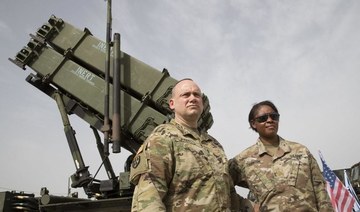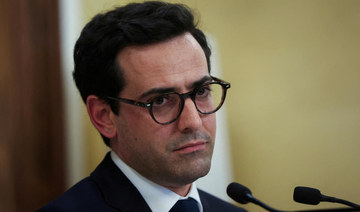WASHINGTON: FBI Director James Comey told Congress that revealing the reopening of the Hillary Clinton e-mail probe just before Election Day came down to a painful, complicated choice between “really bad” and “catastrophic” options.
He said he’d felt “mildly nauseous” to think he might have tipped the election outcome but in hindsight would change nothing.
“I would make the same decision,” Comey declared during a lengthy hearing Wednesday in which Democratic senators grilled him on the seeming inconsistency between the Clinton disclosure 11 days before the election and his silence about the bureau’s investigation into possible contacts between Russia and Donald Trump’s presidential campaign.
Comey, offering an impassioned public defense of how he handled the election-year issues, insisted that the FBI’s actions in both investigations were consistent. He told the Senate Judiciary Committee that the FBI cannot take into account how it might benefit or harm politicians.
“I can’t consider for a second whose political futures will be affected and in what way,” Comey told the senators. “We have to ask ourselves what is the right thing to do and then do that thing.”
Persistent questions from senators, and Comey’s testimony, made clear that the FBI director’s decisions of last summer and fall involving both the Trump and Clinton campaigns continue to roil national politics and produce lingering second-guessing and lingering bitterness about whether the investigations were handled evenly.
On Tuesday, Clinton partly attributed her loss to Comey’s disclosure to Congress less than two weeks before Election Day that the e-mail investigation would be revisited. Trump disagreed, tweeting that Comey actually “was the best thing that ever happened to Hillary Clinton in that he gave her a free pass for many bad deeds!“
Wednesday’s hearing yielded Comey’s most extensive explanation by far for the decision-making process, including his unusual July 2016 news conference in which he announced the FBI’s decision not to recommend charges for Clinton and his notification to Congress months later.
Speaking at times with a raised voice, Comey said he faced two difficult decisions when agents told him in October that they had found e-mails potentially connected to the Clinton case on a laptop belonging to former Rep. Anthony Weiner, D-N.Y., who separated last year from top Clinton aide Huma Abedin. Weiner’s laptop was seized as part of a sexting investigation involving a teenage girl.
Comey said he knew it would be unorthodox to alert Congress to that discovery 11 days before Americans picked a new president. But while that option was “really bad,” he said he figured it’d be worse to hide the discovery from lawmakers, especially when he had testified under oath that the investigation had been concluded and had promised to advise lawmakers if it needed to be reopened.
Plus, he said, his agents weren’t optimistic that they could finish reviewing the thousands of e-mails on the laptop before the election, and could not rule out that they would find evidence of “bad intent.”
“Concealing in my view would be catastrophic, not just to the FBI, but well beyond,” Comey said, in explaining his options. “And honestly, as between really bad and catastrophic, I said to my team we got to walk into the world of really bad. I’ve got to tell Congress that we’re restarting this, not in some frivolous way, in a hugely significant way.”
The FBI obtained a warrant to search the laptop and sifted through thousands of e-mails, Comey said, including ones with classified information that had been forwarded to the laptop by Abedin to be printed out. Though officials found many new e-mails, officials again found insufficient evidence that anyone had intended to break the law, Comey said.
He also said he had not intended to harm the Clinton campaign with his public announcement in July that Clinton and her aides had been “extremely careless” in their handling of classified information though there was no evidence to support criminal charges.
He said he had been concerned for months about how to publicly report the investigation’s findings, and because of Justice Department actions including an impromptu airplane meeting between Bill Clinton and Attorney General Loretta Lynch he had concluded he needed to make the announcement himself.
“My goal was to say what is true. What did we do, what did we find, what do we think about it? And I tried to be as complete and fair” as possible, Comey said.
He also denied that he had treated disclosures about investigations into Clinton’s e-mails differently than potential connections between the Trump campaign and Russia.
The FBI began that counterintelligence investigation in late July, but he did not disclose that until a hearing in March, after Trump had been elected and taken office. That prompted Democrats to complain of a double-standard in the way the investigations were treated. But Comey said that other than confirming the Clinton investigation existed, he did not discuss it until after it concluded last year. And he said the FBI does not expect to have anything to say about the Russia investigation until that one was over.
He declined Wednesday to discuss that investigation or to say which Americans the FBI was looking at.
He strongly criticized WikiLeaks, the secret-spilling website that published e-mails from Democratic accounts that intelligence officials say were hacked by Russia. He likened the site to “intelligence porn” and said it pushed out information to damage the US.
FBI chief ‘mildly nauseous’ at thought he swayed US election
FBI chief ‘mildly nauseous’ at thought he swayed US election

Blinken urges Egypt to ensure aid is flowing into Gaza
“We do strongly urge our Egyptian partners to do everything that they can on their end of things to make sure that assistance is flowing“
WASHINGTON: US Secretary of State Antony Blinken on Wednesday urged Egypt to do everything it can to make sure humanitarian aid is flowing into Gaza as food and medicine bound for the strip piles up on the Egyptian side.
Blinken told a hearing in the House of Representatives that the Rafah crossing in southern Gaza remained closed after Israel’s military seized it on May 7.
Fighting near the crossing has made providing assistance challenging, but aid could still be getting through, Blinken said, an apparent reference to the Kerem Shalom crossing near Rafah that has been open.
“So we need to find a way to make sure that the assistance that would go through Rafah can get through safely, but we do strongly urge our Egyptian partners to do everything that they can on their end of things to make sure that assistance is flowing,” Blinken said.
Israel is retaliating against Hamas in Gaza — an enclave of 2.3 million people — over a brutal Oct. 7 attack by the Palestinian militants. Aid access into southern Gaza has been disrupted since Israel stepped up military operations in Rafah, a move that the UN says has forced 900,000 people to flee and has raised tensions with Egypt.
Egyptian security sources said Egypt cannot bring aid in through Rafah as this would mean an acceptance of the Israeli military’s presence at the crossing, which Egypt opposes.
Egypt’s foreign minister said on Monday that the Israeli military presence and combat operations put truck drivers in danger.
Israel’s strategic affairs minister, Ron Dermer, told MSNBC’s “Morning Joe” the hold-up was Egypt’s fault.
“Right now, Egypt is withholding 2,000 trucks of humanitarian assistance from going into Gaza because they have a political issue about the Rafah crossing,” Dermer said.
Nepal’s ‘Everest Man’ claims record 30th summit
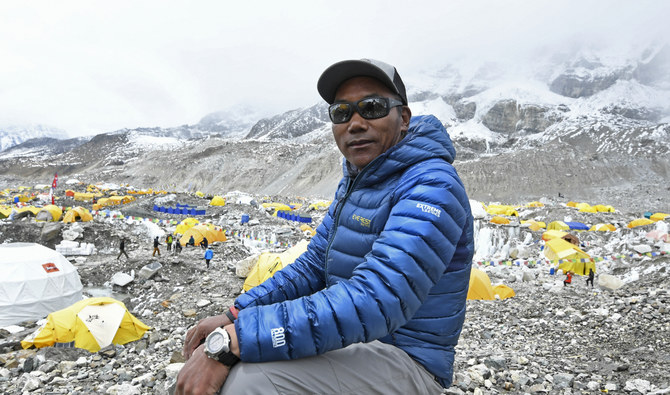
KATHMANDU: A 54-year-old Nepali climber known as “Everest Man” reached the peak of the world’s highest mountain for a record 30th time on Wednesday, three decades after his first summit.
Kami Rita Sherpa, who broke his own record after climbing the 8,849-meter peak for the 29th time earlier this month, has previously said that he was “just working” and did not plan on setting records.
“Kami Rita reached the summit this morning. Now he has made a new record with 30 summits of Everest,” Mingma Sherpa of Seven Summit Treks, his expedition organizer, told AFP.
But celebrations were overshadowed after a Romanian mountaineer was confirmed dead, and a British climber and Nepali guide were reported missing — the latest casualties highlighting the risks of the sport.
Sherpa first stood on the top of Mount Everest in 1994 when working for a commercial expedition.
Since then he has climbed Everest almost every year, guiding clients.
“I am glad for the record, but records are eventually broken,” he told AFP after his 29th climb on May 12.
“I am more happy that my climbs help Nepal be recognized in the world.”
Nepal has issued more than 900 permits for its mountains this year, including 419 for Everest, earning more than $5 million in royalties. Around 500 climbers and their guides have already reached the summit of Everest after a rope-fixing team reached the peak last month.
This year, China also reopened the Tibetan route to foreigners for the first time since closing it in 2020 because of the pandemic.
Nepal is home to eight of the world’s 10 highest peaks and welcomes hundreds of adventurers each spring, when temperatures are warm and winds typically calm.
Last year more than 600 climbers made it to the summit of Everest but it was also the deadliest season on the mountain, with 18 fatalities.
Zelensky says Ukraine needs system to defend against Russia’s guided bombs
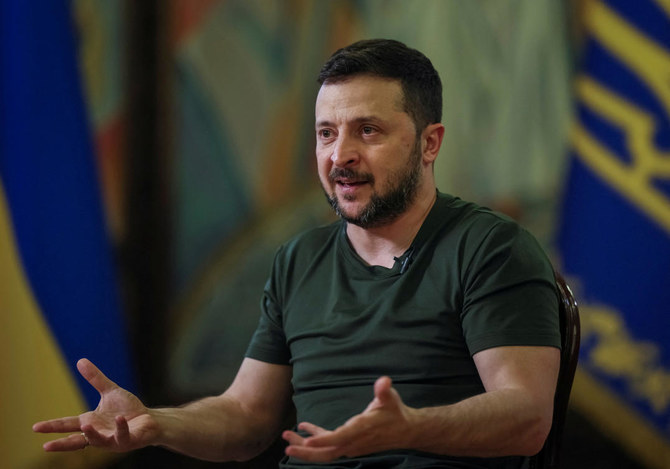
- Zelensky said Ukraine had made progress in developing electronic weaponry, “but in countering Russian bombs much remains to be done“
- “Ukraine needs systems and tactics that will allow us to protect our positions, our cities and our communities from these bombs“
KYIV: President Volodymyr Zelensky issued a fresh plea on Wednesday for upgraded defense systems to protect Ukraine’s cities against guided bombs, which he described as the “the main instrument” now used by Moscow in its attacks.
Zelensky has long called for improved air defenses as Russia intensifies its assaults on energy and other infrastructure. Russia says it does not deliberately target civilian sites, but thousands have been killed and injured since its February 2022 invasion of Ukraine.
Speaking in his nightly video address, Zelensky said Ukraine had made progress in developing electronic weaponry, “but in countering Russian bombs much remains to be done.”
“There can be no alternative. Ukraine needs systems and tactics that will allow us to protect our positions, our cities and our communities from these bombs,” he said.
“This is now practically the main instrument of Russian terror and in the occupiers’ advances.”
Earlier this month, Zelensky said Russia had used more than 3,200 guided bombs against Ukrainian targets throughout April, along with more than 300 missiles and about 300 Shahed-type drones.
Russia has increasingly resorted to these bombs, which are directed to a target by a guidance system, have great destructive potential and pose fewer risks to air crews delivering them.
In his comments, Zelensky said four more countries — Albania, Austria, Chile and Mozambique — had agreed to attend a “peace summit” in Switzerland in June with the aim of creating a broad front to oblige Russia to agree to a peace settlement under the terms of the UN Charter and acceptable to Kyiv.
“Russian aggression has tried to turn the UN Charter into a museum exhibit,” he said. “Our peace summit, the participation of global leaders, can restore the full effectiveness and full protection of the UN Charter to every nation.”
Zelensky’s peace plan calls for the withdrawal of all Russian forces and the restoration of Ukraine’s 1991 borders.
Russia, which rejects the plan, is not invited to the June meeting and dismisses as pointless any discussion of the conflict without its participation.
US says Palestinian state should come via talks, not unilateral recognition
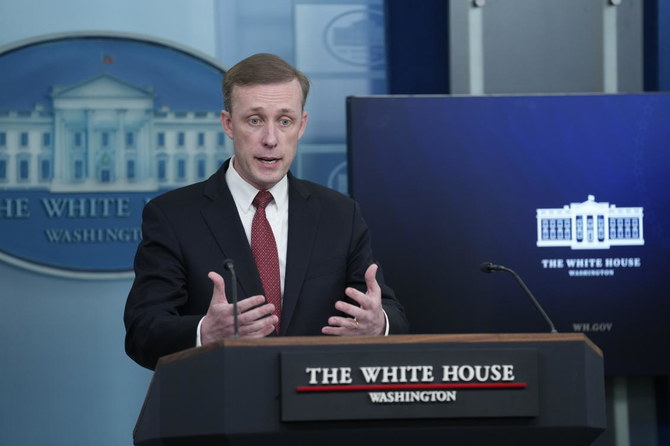
- Washington’s reaction appeared to signal US dismay that the three European nations announced an intent to proceed with unilateral recognition of a Palestinian state
- White House national security adviser Jake Sullivan told a regular news briefing each country could make its own decision on recognition of a Palestinian state
WASHINGTON: US President Joe Biden believes a Palestinian state should be achieved through negotiations, not unilateral recognition, the White House said on Wednesday after Ireland, Spain and Norway said they would recognize a Palestinian state this month.
Washington’s reaction appeared to signal US dismay that the three European nations announced an intent to proceed with unilateral recognition of a Palestinian state, which does not exist in practice.
White House national security adviser Jake Sullivan told a regular news briefing each country could make its own decision on recognition of a Palestinian state, but that Biden thinks direct negotiations by the parties is the best approach.
“President Biden believes that a two-state solution that guarantees Israel’s security and also a future of dignity and security for the Palestinian people is the best way to bring about long-term security and stability for everyone in the region,” Sullivan said.
“President Biden ... has been equally emphatic on the record that that two-state solution should be brought about through direct negotiations through the parties, not for unilateral recognition.”
Sullivan had been asked if the United States was concerned that other nations might follow suit in recognizing a Palestinian state. He said the US would communicate its consistent position to partners “see what unfolds.”
WAR IN GAZA
Decades of US efforts have failed to achieve a “two-state solution” with Israel living alongside a Palestinian state encompassing the West Bank, ruled by the Palestinian Authority (PA), and Gaza, ruled by the Hamas Islamist movement since it seized the coastal strip from the PA in a brief 2007 civil war.
Israel began an offensive in Gaza after Hamas-led gunmen attacked Israel on Oct. 7, killing 1,200 people and taking 253 hostages, according to Israeli figures.
More than 35,000 Palestinians have been killed in Gaza since then, health officials in the Hamas-run enclave say.
Israel is now attacking Rafah in southern Gaza, saying it wants to root out Hamas militants. Hundreds of thousands of Palestinians have fled Rafah since the start of the assault, and the main access routes for aid into Gaza have been blocked.
Sullivan said he was briefed on Israeli plans to minimize civilian harm in Rafah during a weekend visit to the region, and Washington will track whether the assault causes widespread death and destruction or is more precise and proportional.
“We now have to see what unfolds from here,” he said.
He said aid was flowing in from a pier in Gaza, and that it was wrong for Israel to withhold funds from the West Bank.
Court dismisses case against Egyptians accused in shipwreck that killed several migrants, including Pakistanis
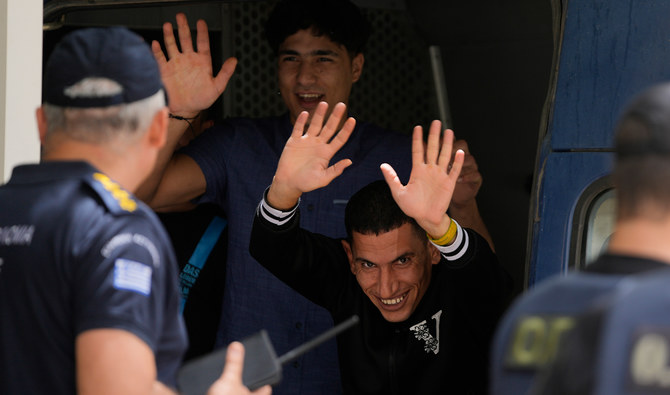
- Nine Egyptians were jailed for nearly a year on suspicion they were crew members of ship that sank last year
- Adriana, carrying hundreds of migrants from Pakistan, Egypt and Syria, sank off a Greek coast in June 2023
NAFPLIO, Greece: A group of Egyptians jailed for nearly a year pending trial for a deadly shipwreck were released from jail Wednesday, a day after a Greek court threw out the case against them on grounds that it had no jurisdiction to try it.
Nine Egyptians had been charged with being part of the crew of the Adriana, a massively overcrowded trawler that capsized and sank near Greece last June with an estimated 700 people on board while sailing from Libya to Italy. Only 104 people survived – all men, mostly from Syria, Egypt and Pakistan — and 82 bodies were recovered.
The nine, who have been in pre-trial custody since their rescue last year, had been charged with being members of a migrant smuggling ring and were accused of having caused the shipwreck. They had faced several life sentences if convicted.
But a court in the southern Greek city of Kalamata on Tuesday ruled it had no jurisdiction to try the case, as the shipwreck occurred in international waters, none of those involved had been trying to enter Greece, the ship was not Greek flagged and no Greek citizens were on board.
The Egyptians’ defense team had argued that the nine were not crew members of the ill-fated trawler but had been paying passengers who were mistakenly identified as crew by nine other survivors, and that they were being used as scapegoats by authorities eager to put all the blame for the tragedy on the trawler’s crew.
Eight of the nine were released from a jail outside the southern city of Nafplio on Wednesday evening. They were transferred to a police station in the city, where they were to remain in custody overnight pending further procedures. It was not immediately clear when they would be fully released from custody.
The ninth defendant was to be released from a different jail.
The massive loss of life in the sinking of the Adriana in the early hours of June 14, 2023, renewed pressure on European governments to protect the lives of migrants and asylum seekers trying to reach the continent. The European border protection agency Frontex says illegal border detections at EU frontiers increased for three consecutive years through 2023, reaching the highest level since the 2015-2016 migration crisis, driven largely by arrivals by sea.
The exact circumstances of how the Adriana sank remain unclear. The trawler was sailing in international waters but within Greece’s search and rescue area of operations, and a coast guard patrol boat and passing merchant ships were near the vessel for several hours. Greek authorities have said the trawler’s crew repeatedly refused offers of help, insisting it wanted to continue to Italy.
Several survivors have said the boat capsized after the Greek coast guard attempted to tow it, an accusation Greek authorities have vehemently denied. A Naval Court investigation into the sinking is still underway.
Speaking at the courthouse after the case was dismissed on Tuesday, Dimitris Choulis, one of the lawyers in the defense team for the nine Egyptians, said attention should turn to how the Adriana sank.
“The court today had to be very brave to issue this decision, and to say that these people are not the smugglers,” Choulis said.
The lawyer blamed the tragedy on the Greek coast guard and Europe’s migration policies, and said it was essential to “make sure that nothing like that would happen again.”





